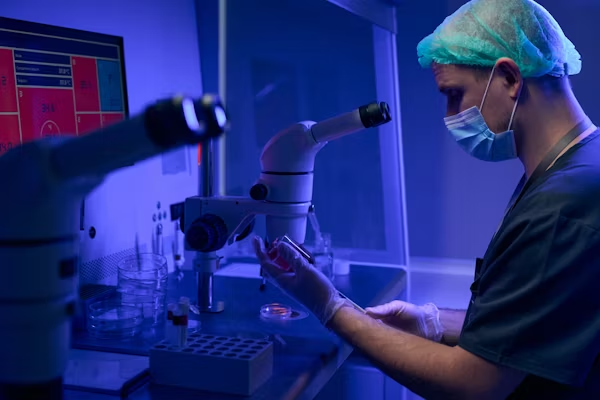Introduction to Biotechnology in Healthcare
Let’s start with the basics. What exactly is biotechnology? In simple terms, it’s the use of living organisms or systems to develop products that improve human health. This could be anything from creating vaccines to developing gene therapies. And guess what? Biotechnology is the backbone of some of the most exciting medical breakthroughs happening right now.
Innovation drives biotech forward. Without the constant push for new ideas and technologies, we wouldn’t be seeing these rapid advancements. Imagine the possibilities when biology meets technology — it’s a game changer for healthcare.
Revolutionizing Disease Diagnosis
One of the coolest things biotech has done is transform how we diagnose diseases. Early and accurate diagnosis means better treatment outcomes. And biotech is making this possible like never before.
Early Detection Technologies
Tech like liquid biopsies allows doctors to detect cancer from a simple blood test — way before symptoms appear. This early warning system can save lives. Biomarkers and advanced imaging techniques also play a huge role here.
Genetic Testing Advances
Genetic testing lets us peek into our DNA to understand risks for diseases like breast cancer or cystic fibrosis. It’s personalized info that can guide prevention and treatment.
CRISPR and Gene Editing: A New Frontier
Basics of CRISPR
Ever heard of CRISPR? It’s like a pair of molecular scissors that can cut and edit DNA with pinpoint accuracy. Developed by scientists like Jennifer Doudna and Emmanuelle Charpentier (Nobel Prize winners!), CRISPR has taken gene editing mainstream.
Therapeutic Applications
From curing genetic diseases like sickle cell anemia to potentially wiping out inherited disorders, CRISPR is a biotech superstar. Clinical trials are underway, showing promising results.
Personalized Medicine: Tailoring Treatment to You
What is Personalized Medicine?
No two people are the same, so why should treatment be one-size-fits-all? Personalized medicine uses genetic and molecular info to customize treatments that work best for each patient.
Benefits & Challenges
It’s like having a tailor-made suit instead of off-the-rack clothing. Benefits include better effectiveness and fewer side effects. But challenges like cost and data privacy remain.
Pharmacogenomics in Action
Pharmacogenomics studies how your genes affect your response to drugs. For example, certain blood thinners or cancer treatments are dosed based on genetic profiles, making therapies safer and more efficient.
Biotech in Vaccine Development
Remember the COVID-19 pandemic? Biotech innovations brought us mRNA vaccines — fast, effective, and groundbreaking.
mRNA Vaccines
Unlike traditional vaccines, mRNA vaccines teach cells to make a harmless piece of the virus, triggering immunity without exposure to the real pathogen.
Rapid Response to Pandemics
This technology has accelerated vaccine development, helping the world respond quickly to emerging diseases.
Regenerative Medicine and Tissue Engineering
Stem Cell Innovations
Stem cells are the body’s repair kit, capable of developing into different cell types. Biotech is harnessing this to regenerate damaged tissues and treat conditions like Parkinson’s.
Growing Organs & Tissues
Scientists are working on growing organs in labs to tackle transplant shortages — a breakthrough that could revolutionize medicine.
3D Bioprinting: Printing the Future
3D bioprinting layers living cells to create tissue structures. This tech holds promise for testing drugs and even building organs, merging biology with engineering.
Artificial Intelligence and Machine Learning in Biotech
AI in Drug Discovery
AI crunches massive datasets to identify potential drugs faster than ever, cutting years off traditional timelines.
Predictive Analytics for Patient Care
Machine learning models predict disease progression and treatment responses, enabling proactive care.
Challenges and Ethical Considerations
Privacy and Data Security
With so much genetic data involved, protecting patient privacy is a top priority.
Ethical Dilemmas in Gene Editing
Altering DNA raises questions about “designer babies,” consent, and long-term effects — debates society must tackle.
The Future of Healthcare with Biotechnology
Emerging Trends
Look out for advances like synthetic biology, microbiome therapies, and nanomedicine.
Global Impact and Accessibility
Ensuring biotech benefits reach all populations worldwide remains a challenge — but it’s one worth overcoming.
Case Studies: Companies Leading Biotech Innovation
Moderna and mRNA
Moderna, a pioneer in mRNA vaccine tech, showed how biotech innovation could meet urgent global health needs.
CRISPR Therapeutics Inc.
This company focuses on bringing gene-editing therapies to market, especially for rare genetic disorders.
How Biotech Innovation Affects Healthcare Costs
Cost Reduction Opportunities
Biotech can reduce long-term costs by preventing diseases or offering curative treatments instead of lifelong management.
Economic Challenges
High research and development costs, along with pricing debates, keep this a complex issue.
Government Role and Regulation in Biotechnology
Regulatory Bodies
Organizations like the FDA and EMA oversee safety and efficacy to protect patients.
Policies Supporting Innovation
Governments worldwide invest in biotech startups and create policies that encourage breakthroughs while safeguarding ethics.
How Patients Benefit from Biotech Breakthroughs
Improved Outcomes
Better diagnostics and therapies mean healthier lives and longer survival.
Access to Advanced Treatments
Telemedicine, digital health, and biotech combined are expanding patient access.
Conclusion: The Transformative Power of Biotech
Biotechnology is rewriting the rules of healthcare. From gene editing and personalized medicine to AI-driven drug discovery, innovation is enabling treatments once thought impossible. While challenges remain — ethical debates, cost, and accessibility — the promise of biotech to improve and extend lives is undeniable. We stand at the cusp of a healthcare revolution, where biology and technology converge to offer hope and healing like never before.
FAQs
1. What is the biggest biotech breakthrough recently?
The development of mRNA vaccines, especially for COVID-19, stands out as a landmark achievement in biotech.
2. How safe is gene editing?
Gene editing like CRISPR shows great promise but is still undergoing clinical trials to ensure safety and effectiveness.
3. Will biotech make healthcare more affordable?
Potentially yes, by preventing diseases and offering cures, but high R&D costs currently keep prices high.
4. How does AI help biotech research?
AI accelerates drug discovery, predicts patient outcomes, and analyzes genetic data more efficiently than humans.
5. What are the ethical concerns of biotech?
Concerns include privacy of genetic data, potential misuse of gene editing, and fairness in access to treatments.

